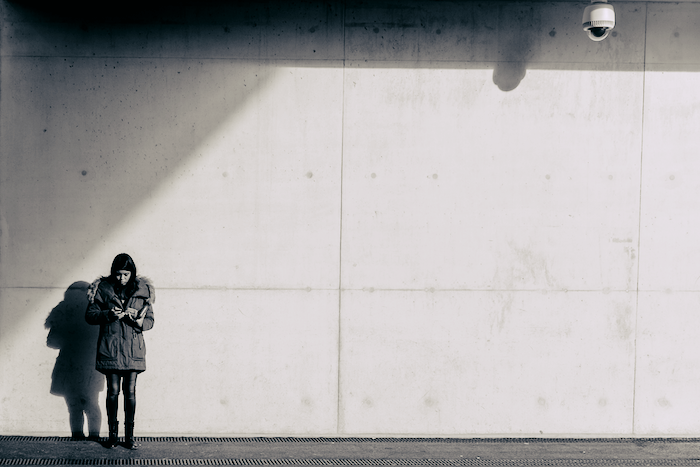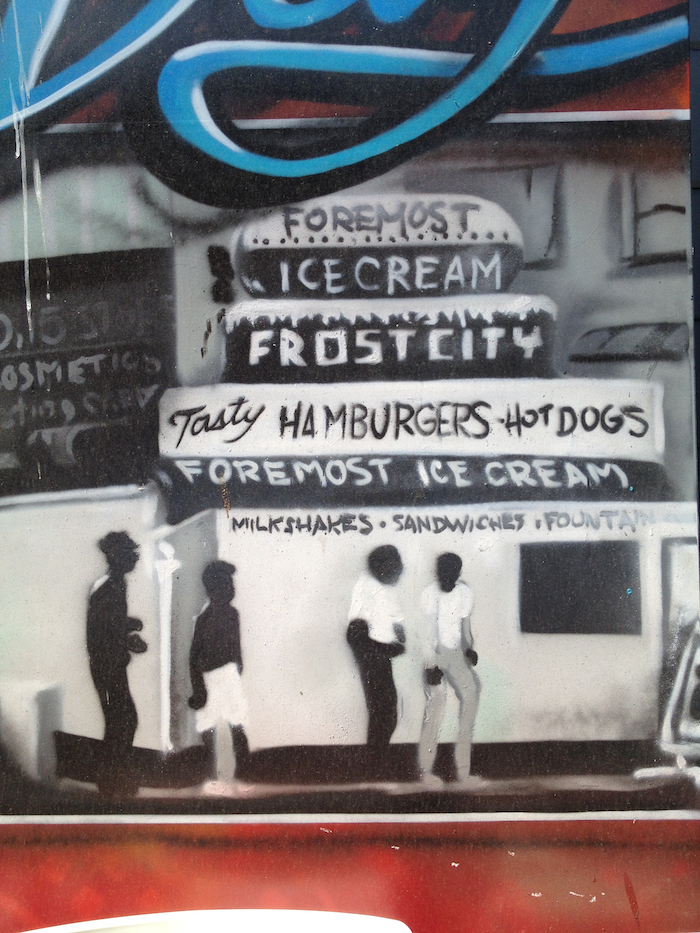Big Brother is An Asshole
There is no way to confirm we’re being treated unfairly because we chose to voice our opinions, whether our visa is rejected or we’re put through extra security at airports. As an immigrant, Big Brother feels even more oppressive.
Interviewer: Hi, is this – ummm – Al-ee-sa?
Me: It’s Ailsa, like “walking down the aisle”, then sa.
Interviewer: Oh that’s a beautiful name! So tell me a bit about yourself, Aleeshia?
Me: Well, my name is Ailsa (aisle-sa) and I’m an Indian from Dubai who –
Interviewer: Oh wow! Dubai huh?
Me: Yeah, I moved there when I was one year old.
Interviewer: So how did you end up in the here?
Me: In America?
Interviewer: Well, yeah!
Me: I went to Mount Holyoke College for four years where I studied English and Journalism.
Interviewer: So your passport is…
Me: Indian.
Interviewer: Which means you require sponsorship?
Me: Yes, I’m allowed to work here for a year and then I require sponsorship.
Interviewer: Oh, I see… The thing is we don’t do that at our company.
In the months since I graduated from college, I can’t tell you how many conversations have gone exactly like that. The problematic part is the ending. I get interviews for jobs that I am qualified for, but I’m not eligible because I’m an immigrant.
It’s not the interviewer’s fault. It’s the American government. They don’t want immigrants.
In order to sponsor you, your employer would have to fill out paperwork, hire an immigration lawyer, justify a reason why they couldn’t hire an American for the position. This takes up a lot of time, money and energy that nobody wants to spend.
And that’s just the beginning. Before the government even reads your application, there is a lottery that randomly chooses whose application gets to be reviewed. Yep, it’s the Hunger Games. No matter how great your application is, if you don’t pass the lottery, you’re packing your bags.
And if you aren’t applying for a job in engineering, science, computers or something business-related, then your chances of getting a visa range from slim to nil. There are special visas for us “creative folk” but that application process is even more ridiculous.
It starts with fifteen letters of recommendation.

Photo CC-BY glasseyes view, filtered.
Since my chances are practically non-existent, I’m constantly being advised to watch what I write about on the Internet. The panic surrounding the US government’s Big Brother-esque surveillance program actually affected my life more deeply than I had initially thought. As an Indian who lives in Dubai, I’m told to make sure my actions and opinions are as unintimidating as possible so that Americans don’t mistake me for a terrorist. There are numerous reports of Sikhs getting mistaken for Muslims and thus, they become victims to extreme violence and discrimination.
If I lived in India before coming to the US, it wouldn’t be as much of a problem. My innocent “sweet Indian” appearance is a privilege that keeps islamophobic trolls, on the Internet and in real life, away. But I grew up in Dubai, that people know that as the neighbor of the deeply Islamic country Saudi Arabia. It’s a thin line and one step in the wrong direction, one political comment that can be interpreted as radical or associate me with Islam, can alert Big Brother and wake the beast up.
Model Minority
During my senior year at Mount Holyoke, I was investigating how one of the college’s male chefs stole a cookie recipe from a female chef. He became famous on campus and till date, the cookie is named after him.
My friend’s sister cautioned her to stay away from my article because it could poorly affect her chances of getting a visa in the United States. I was shocked. I was writing an article about how, even at an all-women’s college, men are favored, take advantage of their privilege and are given more opportunities. My friend’s sister’s first response was not to condemn his actions, but to make sure we don’t step on the toes of people who “matter.”
I don’t think the government thinks cares about the cookie. They do, however, care about more serious, rebellious acts like talking about the controversial attack on the U.S. Consulate in Libya, or going to a mosque, or student Muslim groups. The NYPD only just disbanded the unit that spied on innocent Muslims in America; however, this does not mean that the NYPD has stopped spying on and profiling innocent people.
Stories about immigrants are underreported in the news but there was one Muslim American, Abe Mashal, who was put on the no-fly list for emailing an Imam to ask how to raise a child in an interfaith household. (Obviously there is no way to confirm definitively this was the cause, but it is the main suspicion.) He’s a Muslim and his wife is Christian. He is an ex-Marine, on honorable discharge, making a living as a dog trainer. He eventually filed a lawsuit and won but still, he lost a lot of clients. He was later taken off the no-fly list and wrote a book about it. But how many people have the resources to file a lawsuit and get the national press behind them? Also, this man had the privilege of being an American, so people cared. The American government has a lot of control over people who want something from the US, and they are not afraid to take advantage.
Within Indian communities, we’re constantly told to maintain the model minority stereotype in order to win the “white people” over. It’s part of the colonialism complex where we’re still brainwashed to believe that they are superior. This country doesn’t even have “formal” censorship but our own fear cause us to censor ourselves.
There is no way to confirm we’re being treated unfairly because we chose to voice our opinions, whether our visa is rejected or we’re put through extra security at airports. As an immigrant, Big Brother feels even more oppressive. It’s invasive to a point where it isn’t just about privacy; it’s about waiting for the government to use information they have against us, whether it is by refusing to grant a visa or putting our name on a list of possible threats to National Security.
Though Americans also endure anxiety and difficulties because of the US government’s spying on people, Big Brother is kind of there to protect them. And the more privilege you have, the safer you are.
Big Brother
You know how in George Orwell’s novel 1984, you never really find out if Big Brother is an actual person or not? Well, if he really does exist, I know just his type. Big Brother is a burly, white, racist, homophobic, sexist, heterosexual cis-male bully.
It’s obvious. Metaphorically speaking of course, he’s the macho overprotective brother that says he is defending his sister’s honor but really, he’s just in it for the violence. In actuality, he lives, breathes and operates for the adrenaline that rushes through his bloodstream when he punches that nice guy who just wanted to get to know you.
Obviously, Big Brother is much nicer to men. You know, “boys will be boys.” “They make mistakes and they take a longer time to mature and become responsible men.” That is unless the boys are Muslim of course. In that case, according to dearest Big Brother, its just terrorism in training.

Photo CC-BY Silvision, filtered.
With women, we are misbehaved girls that have spun out of control and need a lesson. That effort to police immigrant women’s behavior by spying on our lives without permission is a form of cyber sexual assault. This may sound like an extreme comparison, government surveillance and sexual assault, but if you think about it, they are both a violation of a woman’s intimate space. Also, there is a culture surrounding surveillance that justifies and accepts this invasion of privacy. The irrational fear of terrorism allows people to ignore the impact that Big Brother has on innocent victims’ lives. This can be equated to rape culture, which blames the victim instead of the rapist because patriarchy operates on its fear of losing control over women.
When you add race and immigration to the mix, does this violent penetration become equivalent to a hate crime? Or is everything fair in the name of national security, even if the principles of this act are based on various forms of discrimination?
When I first heard that there is a new terrorist organization called ISIS that seems to be a much bigger threat than any other terrorist group, you know what I felt? Relief that I was out of school, because at Mount Holyoke the program used to register for classes was called ISIS. I thought, maybe if I was still there and someone went through my texts, it would look like I’m planning an attack on U.S. soil when I’m just applying to classes. Even worse if it’s a religion class on the Koran!
You see that exaggeration? That’s the paranoia that’s instilled in my conscience because I’m constantly being told to play by Big Brother’s rules. The major Big Brother rule that every model minority follows is to distance ourselves from anything that can be mistaken for terrorism or even “Muslim activities” like going to the mosque.
Obama may say that Big Brother is there to protect people but in regards to immigrants, especially from the Middle East, it’s there to watch our every move in case we do something that could be somehow perceived as threatening. The thing is, Big Brother isn’t very smart and equates Muslims, Arabs or even South Asians with terrorism, so model minorities must take it upon themselves to prove that we are not a threat to anybody in the US. It sounds ridiculous but this is a necessary lifestyle choice for people who can’t afford the luxury of being rebellious. They have families, friends, livelihoods and numerous other factors to consider.
However, for me, it is that very mindset, and every other attempt to be a model minority in the eyes of dear old Big Brother, that I am going to unlearn in order to stand up for myself and stop being afraid.


